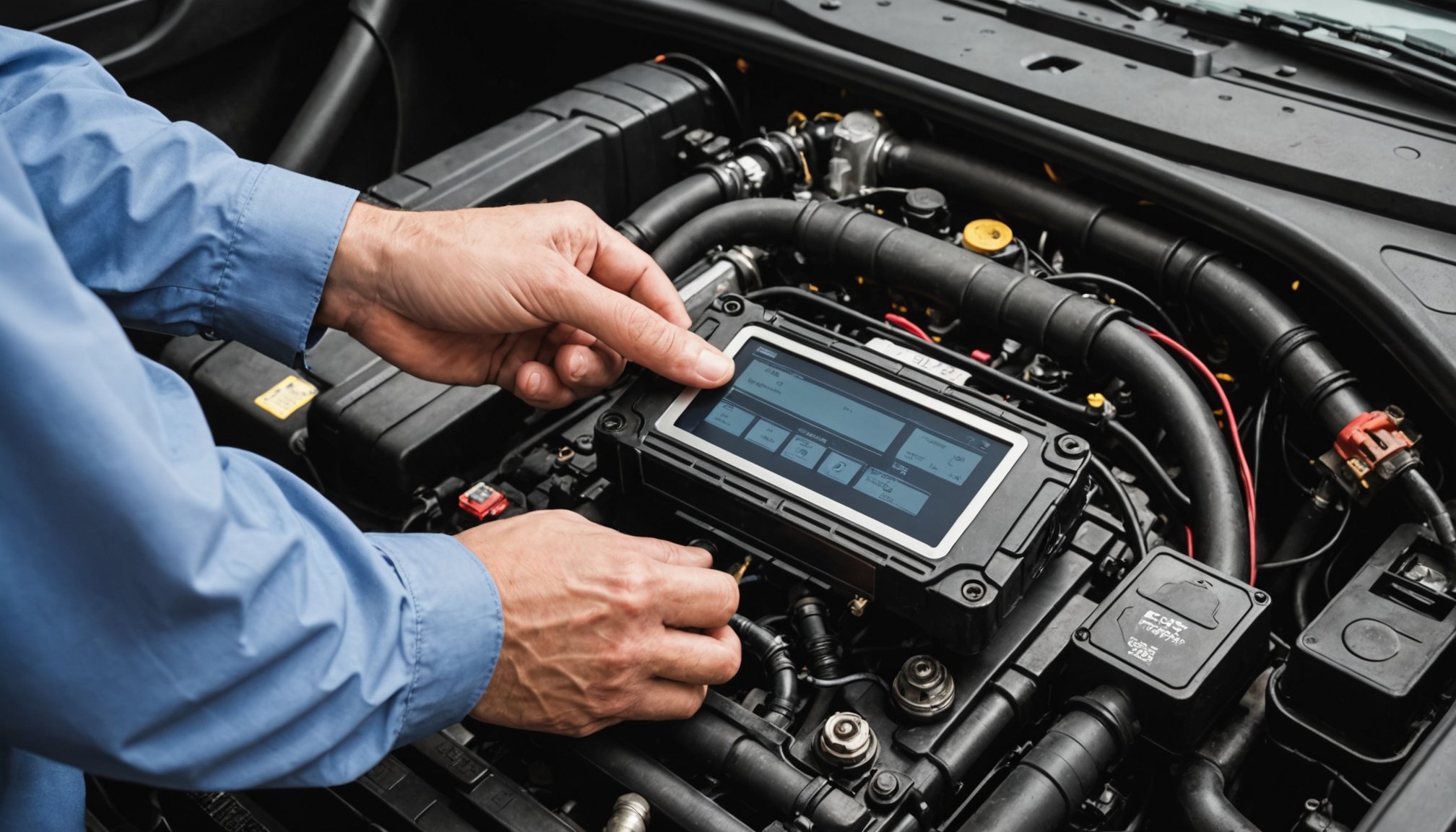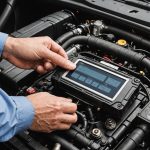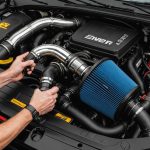Overview of the Powertrain Control Module (PCM)
The powertrain control module (PCM) plays a crucial role in vehicle engine management by integrating various control systems to ensure optimal performance. It acts as the central processing unit that efficiently oversees elements such as ignition timing, fuel injection, and emission controls. By orchestrating these functions, the PCM significantly influences the vehicle’s fuel efficiency and emissions, key factors in modern automotive design.
Components and Features of PCM
A PCM is composed of numerous sensors and actuators. These components work together to collect data and execute commands that regulate the engine’s operation. Sensors monitor parameters such as engine temperature and air-fuel ratio, while actuators adjust engine components based on the PCM’s calculations. This feedback loop is essential for maintaining effective engine performance.
In the same genre : The ultimate handbook for securely installing a fire extinguisher in your commercial vehicle for quick accessibility
The PCM’s sophisticated software features allow it to process real-time data, adapting to driving conditions to enhance fuel efficiency. By continuously adjusting the engine’s operations, it minimizes emissions, ensuring compliance with environmental standards. Understanding the PCM’s role and its features highlights its importance in maintaining vehicle performance and environmental responsibility.
Common Signs of PCM Malfunction
When it comes to car health, recognising the symptoms of PCM issues can prevent significant damage. Engine warning lights, often misunderstood, hold much vital information. Should an unusual indicator activate, it frequently signals a deeper problem, such as a PCM malfunction.
Also to read : Essential signs that your electric vehicle’s thermal management system needs attention
Noticeable variations in engine performance might also suggest PCM-related issues. Erratic idling or unexpected stalling exemplifies vehicle performance concerns engendered by PCM failure. Additional signs include reduced fuel efficiency or inconsistency in power delivery, which can stem from a non-optimally functioning PCM.
Aside from engine matters, other electrical failures may occur due to PCM dysfunction. This could manifest as problems with the transmission, or even random warning signs flickering on the dashboard. While not directly linked, they act as indicators of PCM issues affecting the broader vehicle system. Understanding these warning signs offers drivers an opportunity to address issues before they escalate.
Keep an eye out for unusual behaviours in your vehicle, and consider scheduling a professional inspection should these symptoms arise. Prompt attention to PCM issues mitigates potential escalation in vehicle performance concerns.
Diagnostic Methods for PCM Problems
Accurate diagnosing of PCM issues is vital for resolving engine management concerns. When pinpointing these errors, OBD-II scanners emerge as the primary tool. They efficiently read trouble codes, providing insights into potential PCM and engine problems. By accessing the vehicle’s onboard computer, these scanners detect glitches that might not manifest visibly.
In addition to electronic diagnostics, visual inspections are crucial. Carefully examining wiring and connectivity can uncover issues affecting the PCM’s performance. Cracked wires or corrosion often impede the PCM functions, leading to incorrect data processing. Properly visualising these tiny components can reveal hidden faults.
While basic checks can be conducted at home, professional diagnostic services hold substantial value. Experienced technicians use advanced tools and software, offering a precise analysis of any PCM malfunctions. They interpret diagnostic codes more deeply, clarifying complex issues that might be missed in a DIY assessment.
When electronic diagnostics and visual inspections fail to isolate the problem, seeking expert intervention is recommended. By understanding how to access and utilise these diagnostic methods effectively, vehicle owners can maintain optimal vehicle performance and mitigate costly repairs.
Maintenance Tips for a Healthy PCM
Ensuring the health of your Powertrain Control Module (PCM) through consistent maintenance practices can significantly boost the longevity of your vehicle. One effective approach is the regular update and recalibration of PCM software. Frequent software updates ensure that the PCM functions optimally, adapting to new developments in vehicle technology. Regular checks and updates are pivotal in addressing minor glitches before they escalate into serious problems.
In addition to software care, maintaining clean and secure electrical connections is crucial. Dust and grime accumulation can lead to conductivity issues, affecting the PCM’s performance. Regular cleaning of these connections can prevent potential interference with the engine management system.
Adherence to best practices in vehicle upkeep also plays a supportive role in sustaining PCM health. This involves routine checks by professionals who can spot underlying problems that might not be immediately apparent to vehicle owners. Scheduling timely inspections enhance the PCM’s performance and prevent costly future repairs. By integrating these maintenance tips into vehicle care routines, owners can promote the efficient functioning of the PCM, ensuring long-lasting vehicle performance.
When to Seek Professional Help
Identifying when to seek professional PCM diagnostics is crucial in maintaining vehicle health. If you’re experiencing persistent warning lights, erratic behaviour, or inconsistent power delivery, these are strong indicators that require a technician’s expertise. A professional’s involvement ensures precise troubleshooting, which can prevent further damage to the powertrain control module.
Understanding when to choose repair services over DIY solutions involves evaluating repair costs against potential mistakes and misdiagnoses. While do-it-yourself methods may seem cost-effective initially, they often overlook complex issues that only qualified automotive professionals can address. Expert intervention is invaluable, as professionals have access to advanced diagnostic tools and possess the necessary skills to interpret intricate PCM data.
Furthermore, choosing experienced automotive repair services assures that your PCM functions optimally, maintaining the vehicle’s overall performance. Always opt for a licensed technician, as their deep understanding of PCM functions and vehicle engine management will offer long-term benefits not just in terms of repairs but also in bolstering vehicle reliability and efficiency. Don’t hesitate to seek professional help when PCM issues arise—it’s a sound investment in your vehicle’s longevity.
Conclusion on PCM Attention
Attention to the powertrain control module (PCM) is a direct investment in your vehicle’s reliability and performance. Regular maintenance and proactive PCM care can significantly reduce unexpected mechanical failures and ensure smooth vehicle engine management. This extends beyond addressing existing issues; it involves a comprehensive approach to vehicle upkeep by anticipating potential PCM problems before they develop into costly repairs.
Adhering to a consistent routine of PCM maintenance, such as ensuring electrical connections are clean and up-to-date software recalibrations, enhances the vehicle’s longevity. Proactive actions lead to significant cost-effective repairs, preventing extensive damage that could result in higher repair expenses.
Vehicle reliability is fortified by addressing PCM issues promptly. Taking these steps can minimize the chances of mechanical breakdowns that disrupt travel plans. Moreover, a well-maintained PCM ensures that the vehicle operates within optimal fuel efficiency and emission standards.
The importance of PCM care cannot be overstated; it’s crucial for sustaining overall vehicle health. Encouraging proactive management of your vehicle’s electronic systems ensures long-lasting performance and reliability. Engage with these practices consistently to maintain enduring vehicle efficiency.











